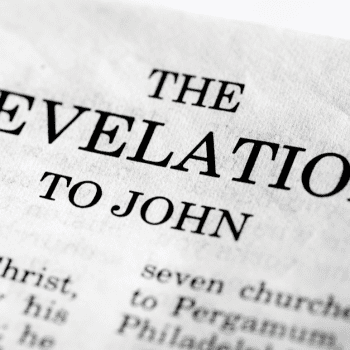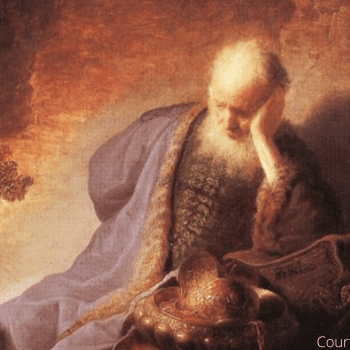
Monday: Read Mark 10:1-31
The theme of discipleship dominates this section. Jesus and the disciples are heading for Jerusalem where He will die. Jesus is going to become more and more explicit with them explaining what “take up your cross and follow Me” means (8:34).
In this passage, Mark tells three encounters that illustrate for us Jesus’ understanding of discipleship with respect to marriage (1-12), children (13-16), and possessions (17-31). Discipleship is not only proper behavior in marriage relations, with children, and with possessions but in fully following Jesus.
If we only had Mark’s account of Jesus’ teaching on divorce, then we would conclude that Jesus does not permit divorce at all. Understanding the context, however, and the fact that Matt 19 and Luke 16 note that Jesus permitted divorce on certain grounds, provides some much needed insights.
First, Jesus’ teaching on divorce here must be understood in light of the kingdom of God: note Jesus’ appeal to Genesis 1 (10:6-8). For Jesus, divorce violates God’s intent at creation. Since the kingdom of God is the restoration and perfection of creation, there should be no divorce. We must recognize that this is the ideal: i.e., the standard: how it is supposed to be. Jesus permits divorce in Matthew 19 and Paul does so in 1 Corinthians 7. How do we reconcile this? Jesus establishes the way it should be in Mark 10. Matthew 19 and 1 Corinthians 7, however, affirm that in light of the continued presence of sin and death, divorce may be permissible—though the ideal should not be easily set aside.
Secondly, Jesus’ words on divorce here were a direct challenge to Herod Antipas. This is the context for Jesus’ remarks. We know because Mark places this conversation in the “region of Judea and beyond the Jordan” (10:1). This is where Herod Antipas ruled. Herod is the one whose marriage John the Baptist had opposed because Antipas married Herodias his brother’s wife, who was also his niece. Also, in 10:12, Jesus says, “if she herself divorces her husband and marries another man, she is committing adultery.” This provision makes no sense. There was no circumstance in Israel in which a woman was allowed, let alone why she would want to, to divorce her husband. Jesus must have been speaking about the injustices that occurred to John the Baptist when he condemned Antipas’ marriage to Herodias.
The kingdom belongs to children (14). For Jesus, the kingdom is for those deemed “children”: i.e., the unimportant: outcasts, needy, oppressed, poor, etc. Ironically, the disciples were “rebuking” (13) those who brought children to Jesus. For Jesus, discipleship means to welcome and embrace (16) those whom society deems unimportant.
The conversation with the rich man (17-31) (we know he is rich because he “owned much property”; 23; Luke 18; calls him a ruler; & Matt 19 says he was young), affirms Jesus’ radical call to self-denial (21). Jesus notes the impossibility of entering the Kingdom through human achievement (27).
The man asks what he must do to enter eternal life (17). Jesus lists 5 of the final 6 commandments and tells him to obey them. A closer look shows that Jesus omitted “thou shall not covet” and adds “do not defraud” (19). It is critical to understand that in ancient Israel the only way one could acquire “much land” (22) was by exploiting (defrauding) the vulnerable: i.e., the “children” or the poor. This man didn’t just covet the land of the poor, he defrauded them and took it!
Nonetheless, the man claims to have obeyed them all. So, Jesus tells him to sell his property and give to the poor (21). The man wasn’t willing to leave his unjust ways behind. For Jesus, giving to the poor (doing justice) and having eternal life were two sides of the same coin!
Questions to ponder/discuss:
- Jesus’ teaching on divorce reminds us that the Kingdom of God includes the restoration of creation. Thus, since God did not intend divorce in His creation, there should be no divorce in the kingdom of God. Reflect on how you can better model the kingdom of God in your inter-personal relationships so that they model God’s intent for creation.
- It is too common for Christians to read the story of the rich young man and conclude that it is a nice story of how Jesus commanded this man to sell everything, but He would never command us to do so. Exactly the opposite of what the text is saying. What is it that Jesus is asking you to give up in order to truly follow Him?
- An excellent resource to supplement this section is David Platt’s, Radical: Taking back your Faith from the American Dream.
Tuesday: Read Mark 10:32-52
Mark 10:32-34 is Jesus’ third “passion prediction” (i.e., the description of His “suffering” that awaits His arrival in Jerusalem: cf 8:31; 9:31). The closer they get to Jerusalem the more specific Jesus becomes about what awaits Him there (33-34). Note that those who followed were “fearful” (32).
The disciples, however, still do not understand that Jesus is going to Jerusalem to suffer, die, and rise again. They believe that they are heading to Jerusalem so that Jesus might become the King. James and John, and likely the rest of the group, expect Jesus to take his seat on the throne in Jerusalem—which He did, it is just that Jesus’ coronation was on the cross (not exactly the kind of crowning moment they were hoping for). So, James and John ask Jesus if they can sit on His right and His left when He takes His seat on the throne in Jerusalem (37). Jesus replies, “you do not know what you are asking for” (38). He, then, uses two metaphors, a cup and baptism (38-39), both of which express suffering. Those two seats, Jesus explains, have already been assigned (40). They are for the two thieves who will be crucified alongside Him.
Mark 10:42-45 is critical for understanding Jesus and the kingdom. The bottom line is that the way Jesus does power is not the way the world does it! The world uses power, money, and war to promote its agenda (NB: every nation uses power, money, and war to promote its agenda). Jesus says, “not in my kingdom!” In His kingdom, the rulers become the servants. As He says, “For even the Son of Man did not come to be served but to serve and to give His life a ransom for many” (10:45).
Questions to ponder/discuss:
- What sort of people do we/you hinder from coming to Jesus by our actions? (our lack of love towards them; our prejudices against them; our failure to treat them as we want to be treated, etc).
- Denying oneself, following Jesus, and loving the other by living cross-bearing lives and suffering are interrelated. The life that Jesus calls us to is not easy. Suffering will come. Ask the Lord for help so that you may overcome prejudice, hatred, selfishness, pride, and whatever stands in the way of living a cross-bearing life of service for the sake of the other. (Imagine if all Christians lived this way more often! What a testimony it would be for the kingdom!)
Wednesday: Read Mark 11:1-26
Jesus has finally reached Jerusalem. We have been waiting for this moment since Mark 1:2: which was a citation of Malachi 3:1: “And the Lord, whom you seek, will suddenly come to His temple.”
Jesus enters on the back of a donkey—which was a blatant claim to being the King. After all, this is the same way that Solomon entered Jerusalem when he was crowned king (1 Kings 1:32-40). The people hail Jesus as the king. They were longing for the day when a Jewish king would be installed, and Rome would be defeated. How is it, then, that the people reject Jesus at His crucifixion? It is because a suffering king is not what they wanted. Once they see Jesus about to be crucified they conclude that Jesus is no better than the dozens of other messianic pretenders that have gone before Him in recent years.
In Mark 11:11, Jesus enters Jerusalem and the temple, looks around, and leaves. What? What did He see? A careful reading of Malachi 3 might clue us in. In Mal 3:1, it says that the Lord is coming to His temple. In Mal 3:2, however, it states that His coming to the temple will not be all good news: “But who can endure the day of His coming? And who can stand when He appears?” (Mal 3:2). The Lord is coming to His temple. But He is doing so in judgment!
Mark explains that when Jesus “looked around” (11) He didn’t see any fruit! Mark’s use of sandwiching brings this out. Mark 11:12-14 records Jesus’ cursing of the fig tree because it had no fruit (12-14). Then, in Mark 11:15, Jesus again enters Jerusalem. Consequently, we realize that Jesus enters Jerusalem and the temple (11:11, 15) and was looking for fruit (11:12-14) and didn’t find any! What kind of fruit was He looking for? The next account (11:15-17) tells us the answer to this question: He was looking for fruit that welcomed the nations into the community of God’s people (17).
As a result, Jesus condemns the temple establishment: “whoever says to this mountain be . . . cast into the sea” (23). “Mountain” is a common symbol for kingdoms (the capital city was always on a mountain) and a temple (which was at the highest point in the capital city). The “sea” is a symbol of chaos (Gen 1:2) and death or hell (Mark 5:13). Jesus was affirming that the mountain of the temple will be cast into the sea/death.
(tune in to the determinetruth podcast that will be aired Jan 25, 2022, for an in-depth discussion of the Sea).
Questions to ponder/discuss:
- What do you think Jesus might praise if He entered our churches today?
- What might Jesus condemn if He entered our churches today?
- If the nations are supposed to be worshipping together in the Kingdom of God (see Rev 7:9-17), why are most of our churches so ethnically divided? What can/should we do to change this?
- Find someone of a different ethnic or religious background and spend an hour getting to know them
NB: To receive auto-updates when new blog posts go live sign up for the newsletter on the top right-hand side of the homepage on determinetruth.com.
My goal is to keep these posts free of charge. I do not intend to ever hide them behind a paywall. I can only do this if those of you who have been blessed by them and can afford to give ($5, $10, $25, or more/month) do so. You can give a tax-deductible contribution by following this link.
Thursday: Read Mark 11:27-12:12 (see Isa 5:1-7; Ps 118:19-23)
The leadership in Jerusalem did not like Jesus or His actions. The temple was the center of their society—it was their Congressional building, their Parliament, their place of authority. Those who ran the temple ran society. When Jesus overturns the tables and creates havoc, He is directing challenging their authority.
(NB: Jesus was not “cleansing” the temple, He was condemning or pronouncing judgment on it—i.e., its leadership. Note that a “den of robbers” (17) means the place where the robbers hide, not the place where they do wrong). Thus, the problem was not what they were doing in the temple, but what they were doing outside it (12:40)—the injustices and oppression of the “children,” as well as the exclusion of the nations.
As a result of Jesus’ actions in the temple, the leadership in Jerusalem, who are very much threatened by Jesus and His popularity among the people, ask Jesus, “by what authority” are you doing these things? (28). The answer, which it appears that Jesus refuses to give them (11:33), is given in the parable of 12:1-12. Since He answers them with a parable, they don’t understand (remember, to understand a parable you must come to Jesus for the explanation; 4:10, 33-34). Jesus’ answer is that His authority is found in that He is the “beloved Son” (12:6) of the owner!
They have been entrusted with the Land God has given them and are responsible for doing justice to all with it. Instead, as we will see in tomorrow’s reading (12:40), they were devouring “widow’s houses” (widows = children).
The parable of the vine-growers is the story of Israel with Jesus the center and final straw. He is a prophet who will suffer like the prophets. He sows seeds (4:3-9) and they do not listen (as with Isaiah). Ironically, the rejection of Jesus becomes the means by which He, the Stone, establishes the new creation/temple.
Questions to ponder/discuss:
- What resources or gifts has God given to you/us so that we might bless others with? How well are they being used? How might you/we do better?
- What are some things that our churches do that exclude others or make them feel unwelcome (note this is a very important question. Most churches that I know believe they are very friendly and welcoming, yet they do not realize that much of what happens on a weekend service in these churches screams “you are not welcome here” to others).
Friday Read Mark 12:13-40
Jesus is challenged with a series of questions intended to put Him in a predicament. These challenges have been radically misunderstood in the modern church. To understand them well, it is critical to remember that Jesus’ fundamental message is: “I am the King who has come to establish an eternal kingdom on Earth as it is in heaven, and I am welcoming all who repent (including you Romans, tax-collectors, prostitutes, handicapped, etc.—i.e., anyone willing to acknowledge that they are the “children”).
The questions Jesus is asked are intended to create a divide: It is either Rome or us! If Jesus chooses “Rome,” He will be rejected by the people. If He chooses “us,” He will be killed by Rome. Win-win for the religious leaders. These questions were also intended to drive Jesus to confess publicly what they suspected He was affirming privately. Namely, that He is the Messiah and that He is divine. The questions are also intended to challenge Jesus’ authority, which has been on Mark’s mind since 11:28.
The first question of paying taxes is a no-brainer: everyone knows it is illegal to pay taxes to Rome (this has been seriously misunderstood by many modern teachers). One cannot be loyal to God and to Caesar at the same time. They are fundamentally opposed to one another. Of course, to not pay taxes is treason and will result in your crucifixion or beheading!
Jesus asks them to show Him a coin. When they pull one out of their pockets, Jesus has them caught in their own hypocrisy. His answer is: what are you doing with an image of Caesar in your pockets? You are carrying His image, not Me!—a violation of the 10 commandments. When Jesus says, “give to Caesar the things that are Caesar’s and to God the things that are God’s,” He is restating the first two commandments. All Jews know that “The earth is the Lord’s, and all it contains” (Ps 24:1). Jesus was not saying, “give some things to God and others to Caesar.” It is all God’s! Instead, he was demanding absolute allegiance to Himself! Technically, then, Jesus was not saying to pay taxes. Of course, He was not saying “don’t pay taxes” either. On one occasion, He even paid them (Matt 17:24-27).
The question regarding marriage and remarriage is more complicated. Simply put, Jesus was contrasting the Sadducee’s view with His. Jesus was presenting a resurrected and glorified new creation. In the ancient world, offspring were necessary in order to provide for the parents when they aged and were not able to work. Jesus’ answer is that in the new creation, there will be no need for offspring because there will be no death. That is, no one will become old and needy.
The final question: “What is the greatest commandment?” is the most significant. First off, notice that this question does not appear to be a trick question. Every Jewish child knows from the time they can talk that the great commandment is from Deut 6:4-9 (the Shema), which says that the Lord is One and He alone is worthy of worship.
What were they asking then? They were likely asking Jesus if He was claiming to be that One God who is worthy of worship? Jesus doesn’t take the bait. Well, He kinda does, but again they don’t understand. His simple answer is “to love the Lord your God” (we will look at the “love your neighbor” in our study of Luke) is the greatest commandment—so easy a 3-year-old could have answered it.
Both Mark 12:35-37 and Matt 22:41-45 note that immediately after this question Jesus presents a riddle about David and Psalm 110:1. The riddle says, David called the Messiah—i.e., his son—“Lord” (Ps 110:1), so what’s the problem? Jesus was saying, “if I am David’s son, and David called me ‘Lord’, then what’s the problem with others calling Me Lord? They, of course, did not understand!
Note: the determinetruth podcast of Sept 21, 2021, addresses this passage more completely.
Questions to ponder/discuss:
- “The Earth is the Lord’s and everything in it.” Except my _____ and ______. We too compromise when it comes to Christ and many things. What does absolute allegiance to Christ look like for you? That is, what are some areas of your life or beliefs that you still try to claim ownership on? Material goods, money, time, pride, anger?
- Set aside some time to pray and ask the Lord to help you let Him be the Lord of all areas of your life.
For further study see Scot McKnight The Jesus Creed
Please share this post and let others know about determinetruth.
If you wish to view this blog on your smartphone through the Determinetruth app simply download the “tithe.ly church” app on your smartphone and insert “determinetruth” as the church name you wish to follow. Once it is loaded, simply click on the “blog” icon and they will automatically load.
[1] This guide is meant to be done either as a group study over the course of 2 or 4 meetings (Day 1-5; 6-10; 11-15; 16-20) or as a private devotion over the course of 4 weeks (or a calendar month—5 lessons per week).












